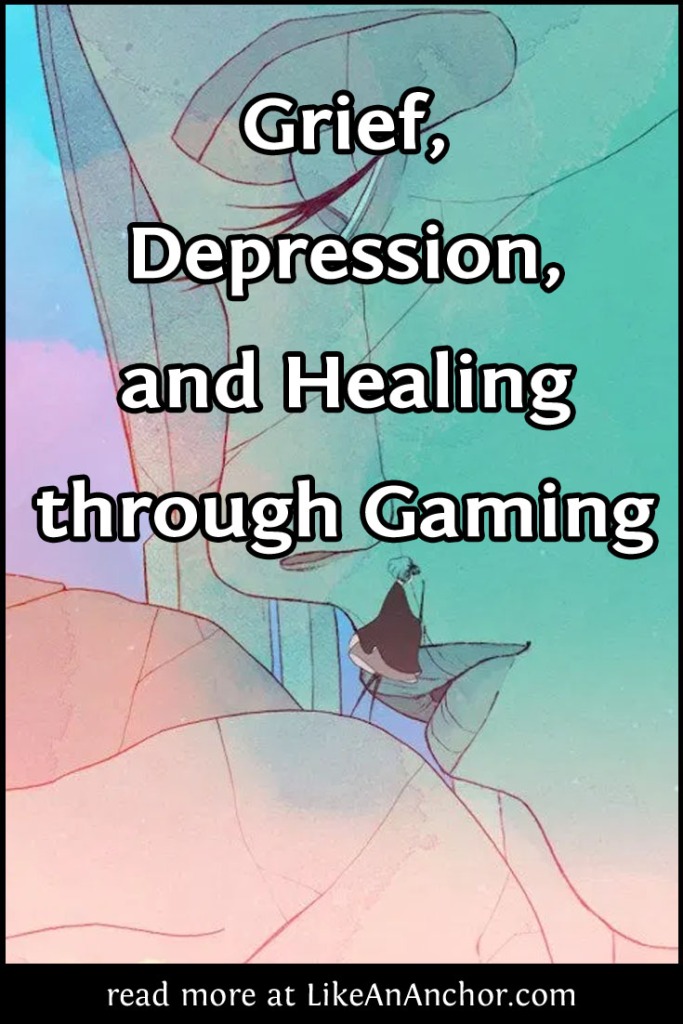Do you ever feel like everything’s going really, really well in all the parts of your life except inside your head? That’s where I’ve been at for a while now. I started grad school and that’s going really well. I’m teaching and tutoring a wide range of ages and subjects and that’s going really well. I have great relationships with my parents and siblings, I’m getting a new sister next year when my brother gets married, and I have a stable, supportive church family. It’s all fantastic. This is probably the best my life has ever been.
And yet, I keep finding myself sinking into depression and struggling with anxiety. What if all this goes away? Going to grad school was always my back-up plan and if that doesn’t work I don’t have anything in mind to fall back on. I look at what’s going on in the world today, and I don’t really have a lot of confidence that society’s going to remain stable. I tell myself that I’m okay with being 32 and single–that I’m not sure I even want a relationship at this point–but then I feel like I might be lying to myself. So I start worrying, and then I feel guilty for worrying, and then I worry about how my glumness is affecting the people around me. And when people who care about me notice there’s something wrong I struggle to tell them what’s wrong because there’s no good reason for all this worry.
This post isn’t just about me sharing my struggles, though. I’m going to be okay–I’m seeing a counselor again a couple times a month to help get myself back on track with my mental health. My reason for writing today is to get us thinking about how to work through the guilt, shame, and disconnected feeling that can go along with having mental health struggles when everything in life seems to be going well. I often hear people talk about how it’s normal to struggle with depression and anxiety when things in your life aren’t good, or recommendations to focus on the positive and get engaged with your life so those feelings will go away on their own. But what if things are already good, and you are engaged with all the positive things in your life, and you still struggle? That can be “normal” too. Not normal in the sense that it’s a good thing to stay there, but normal in the sense that there are lots of other people struggling with it as well.
Fighting the Battles in our Heads
Some time ago, I wrote a post called “Fighting Something You Can’t See.” I’ve been thinking about that idea recently, and I just went back and read what I wrote three years ago. Near the end of that post, I said, “It’s so hard for me to turn anxiety over to God. In a way, letting go of the thoughts demanding constant attention doesn’t seem safe. … [but] God doesn’t want us to cower in the face of attacks inside our minds. He wants to help us fight back. Casting our anxieties on God frees us to let Him help us fight the real battle behind all the other struggles we face.” Past-me had some wise advice, and I think I need to tell myself this once again.
This idea that God wants us to keep trusting Him during the tough times is also something I’ve been studying recently, sort of by accident. It came up when I was reading Peter’s letters as part of studying for the next post in my new series on the general epistles (you can read my post on James here). Peter spends a lot of time, especially in his first letter, reminding people that confronting trials is a normal part of being a Christian and that the source of those is the adversary, the devil who stalks about like a lion seeing to devour God’s people. Peter is also very clear that, with God’s help, we can resist this adversary.
And God will exalt you in due time, if you humble yourselves under his mighty hand by casting all your cares on him because he cares for you. Be sober and alert. Your enemy the devil, like a roaring lion, is on the prowl looking for someone to devour. Resist him, strong in your faith, because you know that your brothers and sisters throughout the world are enduring the same kinds of suffering. And, after you have suffered for a little while, the God of all grace who called you to his eternal glory in Christ will himself restore, confirm, strengthen, and establish you. To him belongs the power forever. Amen.
1 Peter 5:6-11, NET
May grace and peace be lavished on you as you grow in the rich knowledge of God and of Jesus our Lord!
I can pray this because his divine power has bestowed on us everything necessary for life and godliness through the rich knowledge of the one who called us by his own glory and excellence.
2 Peter 1:2-3, NET
God gives us tools for success. He does not promise we won’t face trials or that we will not need to fight battles. Rather, He says He’ll be with us through those things. James and Peter even agree that we can have joy during the challenges and trials we face. That joy comes from us having faith faith and hope that provide context for understanding what we’re going through (James 1:2-3; 1 Peter 1:3-9).
Practical Steps We Can Take

It’s all very well to talk about having faith, hope, and joy when we face trials and using the tools God gives us, but how does that work in real life? As I think most Christians who struggle with mental health issues can attest, it’s not like we haven’t tried praying about these things. We know we’re supposed to turn things over to God and stop worrying, but if you’re like me you’re not really sure how to do that.
I’m going to share a few tips now for practical steps that we can take. Some of these work for me already, while others are recommendations that others have shared and which I’m working on trying out. It’s not an exhaustive list, and since we’re all so different they won’t all work for everyone. I hope, though, that you’ll find something here that’s helpful for you or which sparks an idea of something that might help.
- Practice mindfulness. My dad, sister, and counselor have all stressed this to me recently. It’s not a good idea to live in the fearful “what ifs” of the future. They might not happen at all, and we don’t really have control over them anyways. As Jesus says, “So then, do not worry about tomorrow, for tomorrow will worry about itself. Today has enough trouble of its own” (Matt. 6:34, NET). Being mindful of the present is a conscious choice/effort. It’s part of taking “every thought captive to make it obey Christ” (2 Cor. 10:5, NET).
- Keep the context in mind. When we’re struggling with something inside our minds, we need to remember that we’re not alone and that this is a very real fight. Paul counsels us to remember that “though we live as human beings, we do not wage war according to human standards, for the weapons of our warfare are not human weapons, but are made powerful by God for tearing down strongholds,” including ones inside our own minds (2 Cor. 10:1-5, NET). When you feel like your mind’s under attack or like you’re fighting against something, you’re not going crazy. We are fighting in spiritual battles, and we are not doing it alone. Remind yourself of this, and go to God in prayer. Ask Him to keep His promise to fight alongside you.
- Sing and praise. One way to counter the dark things inside our minds is to speak light out of our mouths. Did Paul and Silas sing in prison because they were so happy to be there, or because they knew that praise would connect them with God, who is the source of the strength and joy they’d need to get through this? (Acts 16:24-26). I’m not sure, but I’m starting to suspect that it’s not very helpful to try and muster up joy silently when we’re struggling. We need to speak/sing to God whether we feel like it or not, and then the joy may follow that. I know I tend to feel better when I sing and listen to Christian music, but I’ve gotten away from that recently. Today as I write this, I’m listening to a lot of Jean Watson and I find that music very uplifting. I also find Jason Gray’s “Sparrows” very fitting for how I feel right now.
- Talk with someone. I know it’s tempting to keep everything to yourself and not let people know how much you’re struggling. But the people who love you would rather have you let them know what’s going on and how they can help and support you than to have you struggle on your own. And if you don’t have anyone you can talk with (or even if you do have someone but your struggles are still having a negative impact on your life), I highly encourage you to seek professional counseling. Click here to start searching for therapists in your area.
Those are the four things I’m using right now to try and work through the anxiety and depression that I’ve been dealing with recently. I’d love to hear from anyone else who wants to share their experiences in the comments or who has advice for others going through similar things. What tips do you have for maintaining a focus on God and holding on to joy during times of inner struggle?














